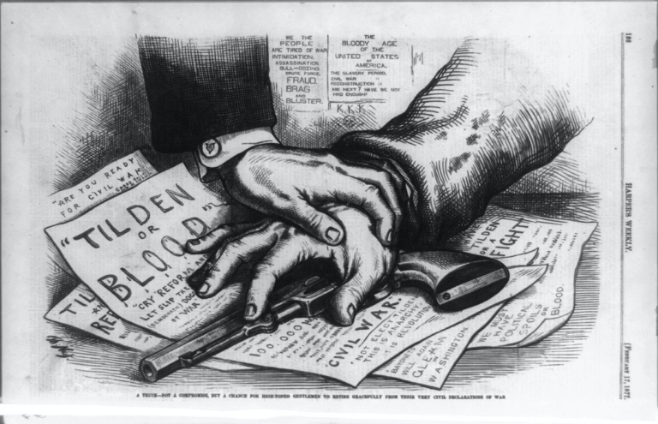As of this morning November 4th, 2020, it feels
like we are in the midst of the most contentious election of all time. We have
several swing states that are still counting votes, lawsuits are in process, mail
in ballots are being counted—chaos reigns!?
However, people living 145 years ago would contest the
notion that this is the most contentious election ever. In 1875, everyone
thought that Ulysses S. Grant would run for his presidential 3rd
term. He was still a popular leader stemming from his record as a general
during the Civil War. Grant's terms were riddled with controversy and corruption
charges, and the House of Representatives actually passed a non-binding
resolution that he should not be allowed to run for a third term, but rather
should respect the tradition established by George Washington that two terms
should be the maximum number of consecutive terms. So, it wasn't all that
surprising that Ulysses decided not to run. It wasn't until the 22nd
Amendment was ratified in 1951 that the two-term limit became inviolable. This decision
left the Republican party in an uproar and, unfortunately, the new front runner
James Blaine of Maine could not garner enough votes to win the nomination. The nomination
instead fell to the Governor of Ohio, Rutherford B. Hayes. It was a hotly contested
convention, but that was just the beginning! Meanwhile, on the Democratic side
there was not a super clear front runner either, but the party settled on
Samuel Tilden as their candidate after a couple of convention roll calls, held
in the Merchants Exchange Building of St. Louis.

Two contested conventions in the same year, and that was the
tame part. I can't claim to know what it was like in those days, in the smoke-filled
back rooms where deals were made. Imagine, it would still be 45 years until
women received the right to vote nationally via the 19th Amendment!
We do know that communications were nowhere as efficient as they are today.
Ballots were counted by hand and, if the newspapers of the day can be relied
upon, there was plenty of fraud and underhanded trickery. I can't put a measure
to that, but what we do know is that the election that year was extremely
close. Back then you needed 185 electoral college votes to win, and Mr. Tilden
had won 184 of them, while four states remained unresolved. Florida, Louisiana,
South Carolina, and Oregon all were disputed. Each candidate claimed victory in
those states, and there were a ton of irregularities. Sound familiar?
It was so hotly contested that both candidates claimed
victory—and both of them began preparing their inaugural speeches. Ultimately,
in the spring of 1877 a commission was formed of five members of the House, five
members of the Senate, and five Supreme Court justices. Ultimately, Rutherford
Birchard Hayes was declared President of the United States. Harpers Weekly
published an interesting article on the situation (picture below) that
encouraged people not to let the heat of passion cause another civil war. Thomas
Nast wrote an article in Harpers Weekly where he calmly advised the
public to accept "A truce—not a compromise, but a
chance for high-toned gentlemen to retire gracefully from their very civil
declarations of war." We will probably never really "know" who the
true winner was.

Those were some hectic days…and here we are again! At least
for today, let's hope things are resolved more clearly this time around.
So, what's the point and what does it have to do with
investing?
It's a fair question, and I want to ask you a question in
return, do you know who Samuel Tilden was? I admit that I did not and yet the
country flirted with a second civil war over his (non?) election. What were the
long-term effects of this turmoil? Well, there were some good(ish) things. Congress
did pass the Electoral Count Act in 1877 which many legal scholars describe as
"extremely messy". We will probably hear more about this in the weeks to come.
For investors though, this whole story should remind you of
one of the key tenets that we have been teaching for the last 25 years: "It is
hard to argue with arithmetic." We can all postulate, fulminate, and yell about
this election and its results, but if we are honest, no one will really
remember what happened in 25 years. And if we are brutally honest with
ourselves, the reality of 1876 will probably hold true again—we may never know
who "truly" won this election to everyone's satisfaction and belief.
I really wanted to get some stock market data for you from
the Tilden-Hayes time frame, but unfortunately, the Dow Jones Industrial
Average was not created until 1896, so I can't give you a graphic, but my point
is simple: Politics will happen. Someone will win and someone will lose and, in
the medium to long term, it probably doesn't matter. We need to be able to
create a disciplined methodology that can help us weather the storms that we
will all face. Emotion is a weak sister to mathematics and discipline.

So, for the umpteenth time, I will go to my simple-minded
mantra: We need to invest over time, count the money, and consider multiple
scenarios. It's really that straightforward.
In the meantime, enjoy the lovely fall weather and
thankfully we will soon be able to put this year behind us. 2020 will be one of those
years that will go down in the record books for so many reasons.
Final, final thought: Thanksgiving is less than 20 days away. It's
time to start visualizing this year's charcuterie board. I would love
suggestions (and donations). Here is a
link to get the creative juices flowing.
Be sure to fill out the form below to subscribe to my weekly blog.


